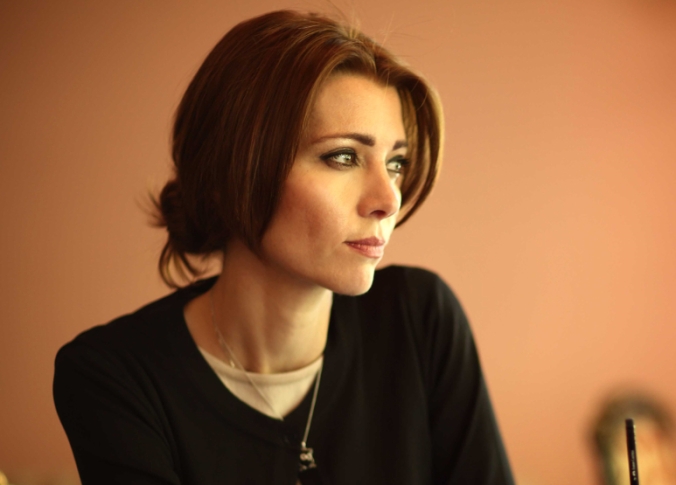Booker Prize shortlist author Elif Shafak's 'The Island of Missing Trees' tells the story of love and war
Booker Prize shortlist author Elif Shafak's 'The Island of Missing Trees' tells the story of love and waron Sep 08, 2021

Set in Cyprus of the 1960s, when the Mediterranean island was caught in a civil war between the Turkish and the Greek Cypriots, the 350-page novel revolves around Defne and Kostas whose love beats the odds to find a 'happily ever after' nearly half a century later.
Cyprus is a beautiful island with beautiful people. It is also an island where there are many untold stories, accumulated grief and hurt and pain. The wounds are not healed. Not at all. The past is not bygone and left behind, the past breathes within the present moment, Shafak told in an email interview.
So it is difficult to handle such a complex and emotionally loaded subject. How do you tell the story of a land that has been divided with a border, destroyed by ethnic conflict and years and years of violence and competing nationalisms and competing religions, how do you tell that story without falling into the trap of nationalism or tribalism yourself? the Booker nominated author asked.
Shafak, 49, who has authored 17 books, including 11 novels, said she didn't know how to approach the story until she found the fig tree - that tells the story of love and of war as it is, not as a Turk or a Greek, man or woman, winner or loser.
Connecting with trees and nature and roots gave me a completely different angle, it helped me to find an opening, and through that opening I was able to walk in. Only then I could dare to write this book, said the author of The Forty Rules of Love.
Through the fig tree, Shafak reflects on the political happenings of the past, the aftermath of the Cyprus crisis of 1963-64, and also seamlessly weaves in contemporary issues, including displacement, mental health and climate change.
Our persistent and deliberate ignorance with regards to trees is mind-blowing. Everyday we walk by them, without really seeing them. I think we have a lot to learn from trees. And this is the right moment for this.
The pandemic and the climate crisis force us to rethink, to stop seeing ourselves as the owners of this planet, stop believing that we are the centre of the universe or we are more superior.
With so much environmental destruction and social inequality and financial greed, humans will disappear someday, but trees will still be around, said the author who has repeatedly drawn the ire of the Turkish state and has been an ardent advocate of the rights for minorities as well as women.
We have to radically change our ways and restructure our societies in a much more egalitarian way and reconnect with nature in a more humble way. We don't have much time to do this, and we can only do it together as humanity, the London-based writer asserted.
The reader might feel inundated by the sheer number of issues Shafak manages to address in a single book, but such is her prowess as a storyteller that it feels overwhelming just where it is meant to be.
There are families that have experienced war, displacement, trauma in only a matter of a few generations...this is human history. If it is not too much for history, if it is not too much for life, why should it be too much for fiction? This is the reality and I think as human beings our hearts and minds are vast enough to process complex thoughts and to empathise at the same time, she said.
Irrespective of the objective approach that writers might take while penning their stories, it is rare to be able to remain untouched from the grief, sorrows and trauma of those who have suffered.
Shafak admits to being no exception.
Authors are not immune to the emotions they deal with in their stories. You feel those emotions in your soul, if you didn't feel them you couldn't possibly write about them. So it does affect me. I cry, I laugh, I keep talking to my characters but more than that, I listen to them. It is not a rational, logical, composed process. Writing fiction comes from the heart, from the gut.
She said she's a mess when she's writing, feeling deeply what her characters are going through.
The subjects I write about are not easy subjects, they are quite heavy, but I am also hoping that my books are life-affirming. They celebrate humanity, connectivity, diversity, empathy and try to encourage wisdom rather than information, try to embrace the beauty and the fragility of being human, said Shafak.
Several of her books, including The Bastard of Istanbul (2006), The Gaze (2000), and her last novel 10 Minutes 38 Seconds in this Strange World (2019), have led her to trouble with the Turkish government.
Shafak was put on trial for insulting Turkishness because she wrote against the Armenian genocide in Turkey and eventually acquitted. She has also been under investigation for obscenity for addressing topics such as child abuse, trafficking, and sexual harassment.
The Island of Missing Trees released on September 5 this year.
Source: theeconomictimes



.jpg)






.jpg)


.jpg)
.jpg)
.jpg)
.jpg)
.jpg)










Sorry! No comment found for this post.